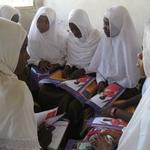Girls need career possibilities
Family planning policies have been implemented around the world for decades, but with limited results. This is also the case in Tanzania where school dropout is a big problem and the majority of girls get pregnant by the age of 20. What are they doing wrong?
For how long would you last if you were constantly told that girls are less talented than boys, and that you should just give up school? Insults and downgrading are part of reality for many Tanzanian teenage girls. An environment that does not value education and a career for women leads many to drop out of school. How do you strengthen their self-esteem and encourage them to be more independent? A field experiment conducted by a team of researchers from Norway and Tanzania suggests that gender empowerment training has a big impact, but it has to be the right kind of training.
-Family planning policies are often based on the assumption that poor young women do not know how to avoid getting pregnant, how to avoid sexually transmitted diseases or how to get an education. There are many examples of NGOs and governmental standard training programmes teaching young girls how to use condoms. Family planning policies often have an aura of paternalism, says Vincent Somville, Senior Researcher at the Chr. Michelsen Institute (CMI).
Predestined to become a teenage mom?
In a collaboration with CMI, the Choice Lab at the Norwegian School of Economics (NHH), the Tanzanian research institute Economic and Social Research Foundation (ESRF), the CSO Femina HIP and Development Pioneer Consultants, researchers study the effect of two training programmes - one in sexual and reproductive health, and one in entrepreneurship. They have mapped young Tanzanian women’s attitudes, hopes and beliefs regarding family and livelihood, and aim to provide policy oriented research output.
Last year, the researchers conducted a survey among 4000 girls from public secondary schools all over Tanzania. Their answers reinforce the picture of a generation of girls that have to work very hard to stay in school, and girls who have low self-esteem and do not feel in control of life circumstances.
Close to 70 percent of the respondents said that they feel helpless dealing with difficulties in life. Almost 40 percent said that it is ok for husbands or boyfriends to beat their partner if she burns the food or refuses to have sex with him. 70 percent said that they were regularly sexually harassed. Very few agreed that it is ok for a wife to earn more than her husband.
-Many Tanzanian girls feel that they have few options in life and are that there is nothing they can do to change their fate, says Somville.
The mere number of teenage pregnancies and the high school dropout rate suggest that young girls are indeed affected by the negative attitudes towards women and education, and women’s career opportunities. Several NGOs, CSOs and governmental initiatives offer empowerment training for girls and women, but up till now, there has been little research as to whether such training programmes can change attitudes and behavior.
*The research project Girls’ Economic Empowerment maps young women’s attitudes, hopes and beliefs regarding family and livelihood. It consists of a survey, qualitative interviews and a field experiment.
*Femina HIP has been involved in all stages of the project. They have a national network of more than 600 Fema Clubs for which they create different media products. The Fema Clubs are organized as extracurricular activities in secondary schools all over the country. Femina HIP offers training programmes for youth and has developed the booklets used in the training of the girls participating in the Girls’ Economic Empowerment project.
Lack of opportunities, not knowledge
The Norwegian and Tanzanian research team have done a field experiment in Tanzania. Girls from schools participating in the project were divided into four groups, of which one got training in sexual and reproductive health, one got training in entrepreneurship, one received both training programmes and one was a control group that received no training at all.
Empowerment, the main goal of the training programme, is difficult to measure. Yet, there is a clear difference between the girls who received training and the control group. The girls who received training were more likely to respond positively to questions about being in control of their life.
Participation in the entrepreneurship training programme had a positive effect. After attending the training programme, more than 50 percent of the girls say that they have developed a business plan. The equivalent number for the control group was 15 percent. Many of the participating girls stressed the importance of having good role models. The leaflets and brochures developed for the programme portray women who diverge from the traditional gender patterns, and the girls frequently referred to these women as powerful examples of how women can break with traditional expectations and take control of their lives.
The training in sexual and reproductive health also had a clear effect on acceptance of gender based violence. The girls who received the gender empowerment trining were less inclined to accept beating after participating in the training programme. For other outcomes, like knowledge about HIV, safe sex and reproductive health, the training had no effect.
-Our research suggests that poor young women know very well how to avoid getting pregnant. So why do they choose to get pregnant as a teenager and hence reduce the chances of getting an education and a job? The answer is probably that they are doing the best they can. In a poor, rural setting where women have very limited economic possibilities, that often means starting a family as soon as possible to gain social status and economic support from a husband. If this pattern is to change, girls need career possibilities, jobs and and income, not condoms says Somville.
Low cost, clear benefits
The Girls’ Economic Empowerment project holds important lessons for policy makers, NGOs and CSOs working on female empowerment. The findings clearly suggest that there is a need for training programmes and policies that empower young women and provide them with career possibilities. An important finding that is not visible in graphs and statistics is that the training programmes that were developed for the field experiment were very positively welcomed by the participating schools and students.
-Participating in the programmes created a lot of enthusiasm and optimism. The explanation is probably the young women’s low self-esteem. In accordance with our findings, it emphasizes the importance of female empowerment programmes of this sort. Simply discussing gender equality, violence and women’s abilities with young people has a very low cost and can bring important benefits, says Vincent Somville.
Exactly how big the benefits are will be clear next year. The researchers will continue the cooperation with their Tanzanian partners throughout the remaining project period, and will do a follow up-study interviewing the girls that participated in the training programmes. Only through following the girls for a longer period of time will they be able to tell whether the training programmes actually made them stay in school, postpone pregnancy or starting up a small business of their own.
Publications
Business training in Tanzania: From research-driven experiment to local implementation

Human and financial capital for microenterprise development: Evidence from a field and lab experiment
Project

